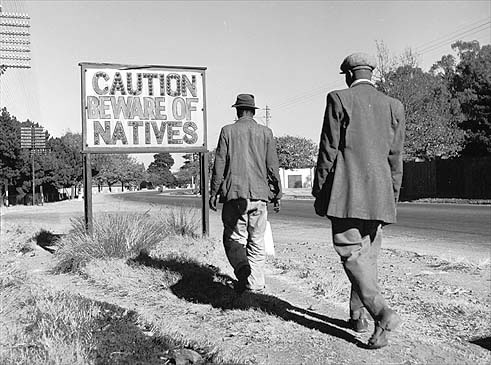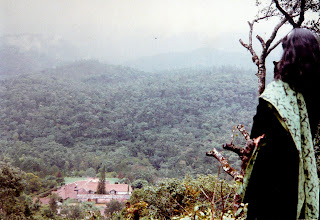Racism and it’s 19th century martyr from South India -The story of Ratnavelu Chetti ICS -
Ever since the so
called "modern civilization" started in the west, racism has raised its ugly
hood in some form or the other. From the age of discoveries to the era of
colonialism and even to the modern times, generations of human beings
especially in Asia, Africa and the Americas have suffered much and have fallen
victims to the most obnoxious behaviour
of the white skinned sapiens.
 |
| Apartheid signs in South Africa 1956 |
We have heard heart-rending stories from the victims of slavery,
apartheid and various other forms of racial prejudices. While I don’t intend to
discuss on the abominable practices of the past centuries, it may not be
inappropriate to discuss on one particular incident from the place I now live.
On most mornings during my walk, I see a monument and a plaque installed in the
memory of one Pulicat Ratnavelu Chetti, the first native ICS officer of Madras
Presidency who was a victim of racial discrimination during
the 19th century British India.
In 1893, on 7th June, Mahatma Gandhi (Then just MK Gandhi, a
young barrister) was evicted from a train in South Africa’s Pietermaritzburg
station because the compartment he was in was reserved for “whites only”. This
was a defining moment in the history of the world because the very pillars of
the great British Empire in which the sun never set started trembling on that
day.
 |
| Actor Nirvikar Bundhoo playing a 24-year-old M K Gandhi getting thrown out of a first-class train compartment at Pietermaritzburg railway station on the 125th Anniversary of the incident |
12 years prior to the above incident, to be exact, on the 28th
of September 1881, in India, in Palakkad a horrendous incident had happened in
which Mr. Ratnavelu Chetti of the Indian Civil Service, who was the Head
Assistant Collector and the Vice President of the Municipality of Palakkad
committed suicide as he was greatly hurt ostensibly because of an incident of
racial discrimination. Chetti was no ordinary official. He was the first native
civil servant of Madras Presidency having been admitted to the ICS in 1876.
The Indian Civil Service (ICS), was the elite higher civil service in
British India for the period between 1858 and 1947.
For the Imperial service, to all covenanted posts, only British officers
were appointed till 1863 and these elite squad ruled over 300 million people of the Indian
subcontinent. Satyendranath Tagore, elder brother of Nobel laureate Rabindranath
Tagore was the first Indian to be selected to the ICS in 1863. Hence, when
Ratnavelu Chetti entered the ICS, there were only a handful of Indians in the
higher echelons of revenue administration in British India.
 |
| Memorial to Pulicat Ratnavelu Chetti ICS at a junction near Palakkad Fort |
 |
| The plaque installed in memory of Pulicat Ratnavelu Chetti |
Pulicat Ratnavelu
Chetti was born in 1856 as the eldest son of Pulicat Ramaswamy Chetti. After
matriculation from the Madras University he attended the Balliol college of
Oxford for his B.A. As a 17 year old, he was a student at Lincoln’s Inn on 26th
May 1873 and was called to the bar on 17th November 1877.
On 28th July
1876, he commenced his service on being selected to the Indian Civil Service and
was posted to the Madras Civil Service.
He arrived Salem on 24th
December 1876 and joined as the Assistant to the Collector and District
Magistrate, Salem on the 2nd of January 1877 and was Assistant
Collector, Chingleput till 9th August 1878. He was Acting Sub-Collector
Chingleput, from 25th July to 7th August 1879. Thereafter he was Acting Head
Assistant Collector and Magistrate, North Arcot, from 9th August 1879. He was
then posted as Assistant to the Collector and District Magistrate, Malabar on
2nd December 1879. He served as Acting
Special Assistant Collector, Malabar from 5th May 1880. Further he was Acting
Inspector General of Registration, from 24th August to 28th September, and from
1st October to 4th November 1880. Then he was posted as Acting Head Assistant
Collector, Malabar, from 13th November 1880 thereby completing service of 4
years, 8 days. He was posted at Palghat in the above capacity.
During the service, he had
qualified in Tamil, Sanskrit, Canarese, Telugu and Malayalam. He was also
drawing salary and allowances of Rs 802 rupees, a princely sum in those days.
Assuming gold price to be Rs 13 per sovereign (as in early 20th century), the
amount could well be equivalent to today’s salary of Rs 15 lakhs per month. And he
was aged only 25.
Ratnavelu Chetti while
serving as Head Assistant Collector and the Vice President of the Municipality
of Palakkad committed suicide on 28th September 1881 at the rather tender age
of 25 thus putting a stop to a very promising career. While there are different
allusions to the reasons for his suicide, the following two stories have gained
popularity.
1. Local historians say that Ratnavelu Chetti, as Head Assistant
Collector once organised a reception to the visiting Malabar Collector, a
British ICS officer under whom he was working. During the function, Chetti
welcomed the guest by shaking hands with the guest. It is reported that the
senior officer with racial prejudices washed his hands in public on the stage
itself in front of the invited guests and attendees as Chetti was black
skinned. Chetti was deeply shocked and the humiliation shattered him and
the consequent indignation and trauma led to his suicide on the same day at his
official residence.
2. Another blog by Mr.Balakrishnan read by me mentions as follows:
“The story behind this
memorial was narrated to me by my late beloved father who was in charge of this
Palakkad Division of Malabar District for some time.
In those days the Head
Assistant Collector was the topmost Government official in the Division. There
were many Europeans in Palakkad engaged in other activities than Government
service. They had an English Club for recreation purpose.
Ratnavelu Chetti being the
topmost Government official was invited to the club when the Britishers were
celebrating the birthday of Queen Victoria, the Queen of the British Empire
(1837-1901). Except Ratnavelu Chetti all others were white men and women.
After banquet and proposal
of toast to the Queen, they were drinking together in honour of the Queen. They
then started ballroom dancing in the large hall with wooden flooring. While the
couples were dancing, Ratnavelu Chetti the only Indian present there sat
watching them dance.
A white couple who were
dancing gyrated towards the place where Ratnavelu was sitting. Then the white
woman asked her partner” who is this crow among the swans” and moved away.
Ratnavelu Chetti abruptly
got up and hastened to his bungalow. There he shot himself dead.
What was in his mind that
made him to act like this? Nobody knew. He did not leave behind a suicide note.
May be it was hatred, humiliation and helplessness. He was helpless before the
mighty British Empire and the rulers. It was a time when they boasted, the sun
never sets in the British Empire”.
As per my research, Mr.
George McWatters, B.A. Barrister at law was the acting Collector and Magistrate
of Malabar from 25th January 1881 succeeding the redoubtable William Logan.
Logan, the proud Scott and historian as he was, would not have stooped to the level of an
ordinary egoistic Officer, I presume.
Ratnavelu Chetti had a brother (3rd son of Pulicat Ramaswamy Chetti) who was at Downing, Cambridge in 1884. He was admitted to Inner Temple in November 1884 and was called to the bar in 1888.He did not practice in England and died in India in 1901.
Recently a theatre group
staged a play on the life of Ratnavelu Chetti to honour this victim of racism
who had laid solid foundation for Palakkad to develop it as an important town
in British Malabar
References:
1) http://www.ebooksread.com/authors-eng/joseph-foster/men-at-the-bar--a-biographical-hand-list-of-
the-members-of-the-various-inns-of--058/page-22-men-at-the-bar--a-biographical-hand-list-of-the-
members-of-the-various-inns-of--058.shtml
the-members-of-the-various-inns-of--058/page-22-men-at-the-bar--a-biographical-hand-list-of-the-
members-of-the-various-inns-of--058.shtml
2) Asylum Press Almanacs and compendium of intelligence 1876 to
1882
3) Blog by A Balakrishnan:
https://idleimpressions.wordpress.com/2018/08/19/humiliations-and-
reactions/
reactions/
4) Blog “Palakkad Walks”:
http://palakkadwalks.blogspot.com/2011/11/wonder-city-of-palakkad.html
5) Press reports : https://www.thehindu.com/todays-paper/tp-national/tp-kerala/this-is-not-just-
another-lamppost/article6493108.ece
another-lamppost/article6493108.ece
6) Drama in you tube: Directed by Ravi Thykatt :
https://www.youtube.com/watch?
v=sJnwkn1nKNM&feature=share
7) Alumni Cantabrigienses: A Biographical List of All Known Students, Graduates ...edited by John Venn
8) http://www.dow.cam.ac.uk/about/downing-college-archive/archives-college-history/downing-college-
v=sJnwkn1nKNM&feature=share
7) Alumni Cantabrigienses: A Biographical List of All Known Students, Graduates ...edited by John Venn
8) http://www.dow.cam.ac.uk/about/downing-college-archive/archives-college-history/downing-college-
and-india




Comments